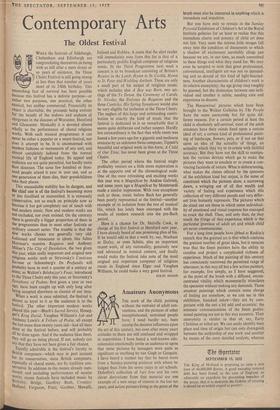Contemporary Arts
The Oldest Festival
WHILE the festivals of Aldeburgh, Cheltenham and Edinburgh are congratulating themselves on being with us still after a mere dozen or so years of existence, the Three Choirs Festival is still going strong at less than that number of years short of its 250th birthday. This astonishing feat of survival has been possible because this festival has a definite purpose—or rather two purposes, one practical, the other musical, but neither commercial. Financially its Object is charitable, the proceeds being entirely for the benefit of the widows and orphans of clergymen in the dioceses of Worcester, Hereford and Gloucester. Musically it is devoted almost Wholly to the performance of choral religious Works. With such musical programmes it can never be either a popular or a smart festival, nor does it attempt to be. It is unconcerned with modern fashions or movements of any sort, and almost completely isolated from the normal musical life of England today. Its appeal and audience are not quite parochial, but hardly more than diocesan. The same few hundred or thou- sand people attend it year in year out, and as one generation of them dies, their grandchildren take their places.
This unassailable stability has its dangers, and the chief one is of the festival's becoming more or less fossilised or mummified. It is extremely conservative, not so much on principle now as because it has got completely out of touch with real modern music. New and modern works are not excluded, nor even resisted. On the contrary there is generally a bigger proportion of them in the programmes than in most other festivals or ordinary concert series. The trouble is that the new works chosen are generally very old- fashioned and innocuous in idiom, like Julius Harrison's massive Requiem and Anthony Milner's The City of Desolation, the two given this year, while really important and original new religious works such as Stravinsky's Can ticum Sacrum or Schoenberg's De Profundis will Probably have to wait a quarter of a century or more, as Walton's Belshazzar's Feast, introduced to the Three Choirs only this year, or Stravinsky's SYmphony of Psalms, first given a year or two ago, have been caught up with only long after being accepted elsewhere as classics of our time. When a work is once admitted, the-festival is almost as loyal to it as the audience is to the festival. The other important modern works Played this year—Bloch's Sacred Service, Honeg-. gets King David, Vaughan Williams's Job and Anthony Lewis's A Tribute of Praise, all except the last more than twenty years old—had all been done at the festival before, and will probably all be done again. And if the audience likes them, they will go on being played. If not, nobody can saY that they have not been given a fair chance. Equally admirable is the festival's loyalty to British composers—which may in part account for its conservatism, since British composers, especially of choral music, are by tradition con- servative. In addition to the names already men- tioned, and excluding performances of secular works, recent festivals have included music by Berkeley; Bridge, Geoffrey Bush, Crossley.- Rolland, Ferguson, Finzi, Gardner, Howell's,
Ireland and Rubbra. A name that the alert reader will immediately miss from this list is that of a particularly prolific English composer of religious music. In the Third Programme next week a concert is to be broadcast consisting of Britten's Rejoice in the Lamb, Hymn to St. Cecilia, Hymn to St. Peter and Wedding Anthem. These are only a small part of his output of religious music, which includes also A Boy was Born, two set- tings of the Te Deum, the Ceremony of Carols, St. Nicolas, the Sin fonia da Requiem and the three Canticles. His Spring Symphony would also be very eligible for inclusion at the Three Choirs. The neglect of this large and outstanding contri- bution to exactly the kind of music that the festival is dedicated to is so remarkable that it seems quite deliberate and rather suspect. Hardly less extraordinary is the fact that while room was found a few years ago for a gigantic and mediocre oratorio by an unknown Swiss composer, Tippett's beautiful and original work in this form, A Child of Our Time, has never been given at the Three Choirs.
The other period where the festival might profitably venture on a little more exploration is at the opposite end of the chronological scale. One of the most refreshing and exciting works this year was a Magnificat by Andrea Gabrieli, and some years ago a Magnificat by Monteverdi made a similar impression. With rare exceptions such as these, music before Bach has generally been poorly represented at the festival—another example of its isolation from the rest of musical ' life, which has lately been swamped with the results of modern research into the pre-Bach _period. Here is a chance for Dr. Melville Cook, in charge of his first festival at Hereford next year. I have already heard of one promising plan of his. If he would add to that a work by, say, Machaut or Dufay, or even Schiltz, plus an important recent work, of any nationality, genuinely new and advanced in musical content, and finally would make the festival take note of the most original and important composer of religious music in England since Elgar and Vaughan Williams, he could make a very good festival.
COLIN MASON


































 Previous page
Previous page